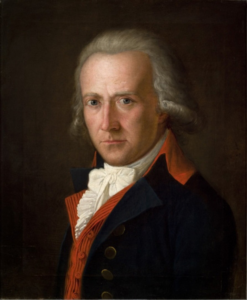Spirit of love
(Poet's title: Geist der Liebe)
Set by Schubert:
D 414
[April 1816]
D 747
for TTBB quartet and piano[January 1822]
Der Abend schleiert Flur und Hain
In traulich holde Dämmrung ein;
Hell flimmt, wo goldne Wölkchen ziehn,
Der Stern der Liebeskönigin!
Die Wogenflut hallt Schlummerklang,
Die Bäume lispeln Abendsang,
Der Wiese Gras umgaukelt lind
Mit Sylphenkuss der Frühlingswind.
Der Geist der Liebe wirkt und strebt,
Wo nur ein Puls der Schöpfung bebt;
Im Strom, wo Wog’ in Woge fließt,
Im Hain, wo Blatt an Blatt sich schließt.
O Geist der Liebe! führe du
Dem Jüngling die Erkorne zu!
E i n Minneblick der Trauten hellt
Mit Himmelsglanz die Erdenwelt!
The evening is draping the field and woods
With a beautiful, cosy twilight;
Brightly flickering up there where little gold clouds are passing by
Is the star of the goddess of love.
The flooding waves resound with a sleepy sound,
The trees whisper an evening song;
The grass on the meadow flutters about gently
With the kiss of sylphs on the spring breeze.
The spirit of love is at work and is striving
Where only a single pulse of creation is stirring;
In the river, where wave flows into wave,
In the grove, where leaves fold over other leaves.
Oh spirit of love! lead
The chosen one to this lad!
A single look of love from the devoted one brightens up
The realm of Earth with the glow of Heaven!
All translations into English that appear on this website, unless otherwise stated, are by Malcolm Wren. You are free to use them on condition that you acknowledge Malcolm Wren as the translator and schubertsong.uk as the source. Unless otherwise stated, the comments and essays that appear after the texts and translations are by Malcolm Wren and are © Copyright.
☙
Themes and images in this text:
Clouds The earth Evening and the setting sun Fields and meadows Floods and tides Gazes, glimpses and glances Gold Grass Heaven, the sky Hesperus, the evening star (Venus) Kissing Leading and directing Leaves and foliage Lullabies Rivers (Strom) Serenades and songs at evening Sleep Spring (season) Stars Trees (general) Veils Waves – Woge Whispering Wind Woods – groves and clumps of trees (Hain)
We are at that moment at the end of the day when the encroaching darkness seems to illuminate rather than obscure our world. Things calm down sufficiently for us to notice details and hear sounds that are blocked out in the busy-ness of the day. It is not that the course of life stops or changes at this point; quite the reverse, it is precisely how things really are, their essence, that becomes apparent. For Matthisson the cosy veil of twilight allows us to see the evening star, now as brightly glowing as ever but only at this point visible to us. This ‘star of love’, the planet Venus of course, actually makes sense of everything that has been happening down on earth all day without us being able to see it explicitly.
Stanza 2 turns our attention from the visual to the aural dimension. In the evening we are able to hear what was happening earlier but since it was in the form of background noise we were deaf to it: a flowing river, rustling trees, even blades of grass swaying in the breeze. We can now hear these sounds as distinctly ‘evening songs’ or ‘lullabies’. Stanza 3 interprets the message of these ‘songs’: they are all a manifestation of the spirit of ‘love’ in that they are all a result of movement. The water is not still, the leaves are restless. Some of the waves have an urge to unite with other waves, some of the leaves want to touch or even enclose other leaves. However calm the scene becomes, for as long as there is a single movement the spirit of love is doing its work, expressed in all of the drives and forces of nature.
Even when we think that everything is asleep, the sun has set and the scene is fully dark the flickering of Venus allows us to look around and see the scene with a new clarity. Our senses have been opened up to the power of love driving everything around us. That is what can happen in the twinkling of an eye too.
☙
Original Spelling Geist der Liebe Der Abend schleiert Flur und Hain In traulichholde Dämmrung ein; Hell flimmt, wo goldne Wölkchen ziehn, Der Stern der Liebeskönigin. Die Wogenfluth hallt Schlummerklang, Die Bäume lispeln Abendsang; Der Wiese Gras umgaukelt lind Mit Sylphenkuß der Frühlingswind. Der Geist der Liebe wirkt und strebt, Wo nur ein Puls der Schöpfung bebt; Im Strom, wo Wog' in Woge fließt, Im Hain, wo Blatt an Blatt sich schließt. O Geist der Liebe! führe du Dem Jüngling die Erkorne zu! E i n Minneblick der Trauten hellt Mit Himmelsglanz die Erdenwelt! Note: The initial version of this poem, published with the title Abendlied(Evening song), is slightly different: Der Abend schleiert Flur und Hain In traulichholde Dämrung ein, Manch Wölklein hell in Westen schwimt, Vom sanften Liebesstern durchflimt. Die Wogenflut tönt Schlummerklang, Die Bäume lispeln Abendsang, Der Wiesengras durchhaucht gelind Der liebe Sommerabendwind! Der Geist der Liebe wirkt und webt In allem, was sich regt und lebt! Im Meer, wo Wog' in Woge fließt, Im Hain, wo Blat an Blat sich schließt! O Geist der Liebe! führe du Mir meine fromme Laura zu, Mit ihr, bei dieser Sterne Schein Der Schöpfung Gottes mich zu freun!
Confirmed by Peter Rastl with Gedichte von Friedrich von Matthisson. Erster Theil. Tübingen, bei Cotta, 1811, page 39.
To see an early edition of the text, go to page 39 [61 von 380] here: http://digital.onb.ac.at/OnbViewer/viewer.faces?doc=ABO_%2BZ185186703


